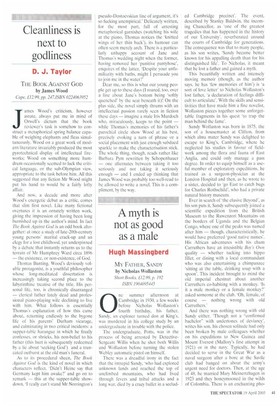Cleanliness is next to godliness
D. J. Taylor THE BOOK AGAINST GOD by James Wood
Cape, £12.99, pp. 247,ISBN 0224063952
jiames Wood's criticism, however astute, always put me in mind of Orwell's dictum that the book reviewer's task is somehow to construct a metaphorical spring balance capable of weighing elephants and fleas simultaneously. Wood on a great work of modern literature invariably produced the most pyrotechnical display of intellectual fireworks; Wood on something more humdrum occasionally seemed to lack the critical language, or the sub-Olympian view, appropriate to the task before him. All this suggested that any fiction Mr Wood might put his hand to would be a fairly lofty affair.
And now, a decade and more after Wood's energetic debut as a critic, comes that slim first novel. Like many fictional overtures it is an ornately written work, giving the impression of having been long burnished up in the author's mind. In fact The Book Against God is an odd book altogether: at once a study of late-20th-century young persons' marital crack-up and an elegy for a lost childhood, yet underpinned by a debate that instantly returns us to the terrain of Mr Humphrey Ward circa 1896 — the existence, or non-existence, of God.
Thomas Bunting, Wood's deviously voluble protagonist, is a youthful philosopher whose long-meditated dissertation is increasingly taking second place to the labyrinthine treatise of the title. His personal life, too, is chronically disarranged — clerical father lately dead and professional piano-playing wife declining to live with him. What follows is essentially Thomas's explanation of how this came about, returning endlessly to the bygone life of his parents' Durham vicarage, and culminating in two critical incidents: a supper-table harangue in which he finally confesses, or shrieks, his non-belief to his father (this hurt is subsequently redeemed by a lie about 'seeking God') and a truncated outburst at the old man's funeral.
As to its procedural sheen, The Book Against God is the kind of novel in which characters reflect, 'Didn't Heine say that Germany kept him awake?' and go on to remark — this at the supper-table showdown, 'I really can't stand Mr Norrington's pseudo-Dostoevskian line of argument, it's so fucking unempirical.' Delicately written, for the most part, full of arresting metaphorical garnishes (watching his wife at the piano, Thomas notices the 'knitted wings of her thin back'), its humour can often seem merely arch. There is a particularly unhappy account of Jane and Thomas's wedding night when the former, having removed her 'punitive pantyhose', enquires of the latter, 'Despite your unfamiliarity with baths, might I persuade you to join me in the water?'
Dear me, so this is what our young people get up to these days (I roared, too, over a line about Jane's bottom being 'softly quenched' by the seat beneath it)? On the plus side, the novel simply thrums with an intellectual passion rarely seen in fiction these days — imagine a male Iris Murdoch who, miraculously, keeps to the point — while Thomas's memories of his father's parochial circle show Wood at his best, precisely evoking a turn of phrase or a social placement with just enough subdued sparkle to make the characterisation stick. The whole thing, though, reads rather like Barbara Pym rewritten by Schopenhauer — one alternates between taking it too seriously and not taking it seriously enough — and I ended up thinking that James Wood was probably too well-read to be allowed to write a novel. This is a compliment, by the way.


































































 Previous page
Previous page